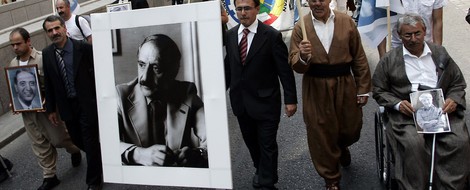Your podcast discovery platform
Curious minds select the most fascinating podcasts from around the world. Discover hand-piqd audio recommendations on your favorite topics.

piqer for: Climate and Environment Globalization and politics Health and Sanity
Mona Silavi is a human and women’s rights activist from the Ahwaz region in Iran. She obtained her bachelor in psychology and specialized in children and adolescence psychology at Damascus University, faculty of psychology and education. She holds a master degree in good governance and human rights in MENA region from Ca’ Foscari University in Venice. She started her activism in Damascus as member of Ahwazi Arab student association. Mona Silavi is a Project Officer at the Unrepresented Nations and Peoples Organization (UNPO) and is the coordinator for topics concerning freedom of religion and belief. She is also a spokesperson of the Al-Ahwaz Democratic Solidarity Party (DSPA). Since 2014 Ms Silavi lives in Belgium as a political refugee
Did The Iranian-Led Assassinations Abroad Ever Stop?
After the successful revolution in Iran in 1979, the Iranian government engaged in political assassinations within and outside its borders in order to eliminate its opponents.
The political assassinations inside Iran are known as the “Chain Assassination” or “Serial Murders”. Their victims included more than 80 intellectuals who were critical of the system in Iran, killed by different methods such as shootings, car crashes, stabbings, staged robberies and even injections with potassium to simulate a heart attack.
While the team of assassins was carrying out the physical elimination of the political opposition inside Iran, the foreign team was conducting parallel missions in killing political opponents outside of the country.
At least 162 members of Iran's political opposition were killed in nineteen different countries around the world. Most notable was the assassination of leading members of the Democratic Party of Iranian Kurdistan (PDKI), Dr. Mohammad Sadegh Sharafkandi, and three of his colleagues at Mykonos Restaurant in Berlin. By 1996, Iran was condemned in German courts for carrying out the “Mykonos Assassination”.
The “Mykonos Assassination” affected the Iranian government and forced its members to change their discourse toward the West in order to avoid an open confrontation. This, in turn, led to the creation of the reformist wing in Iran.
After this case, the assassinations decreased, however, they never fully stopped, and recently despite the fact that Iran is under international pressure, Europe once again has focused on the Iranian government because of further assassinations.
In this article, news of recent assassination missions are highlighted, but it seems that just like in the 1990s, European authorities will try to cover up these news.
Stay up to date – with a newsletter from your channel on Globalization and politics.
